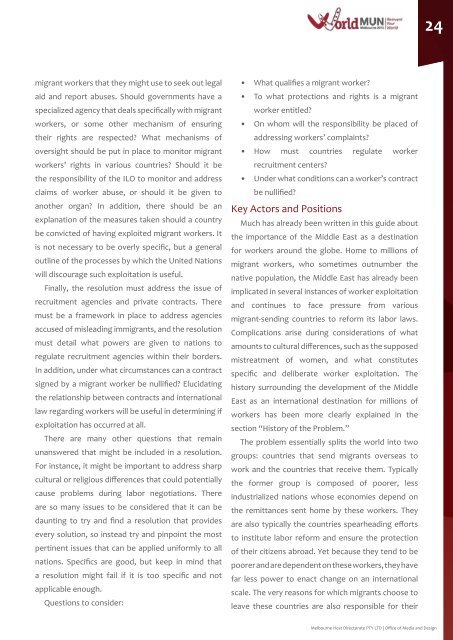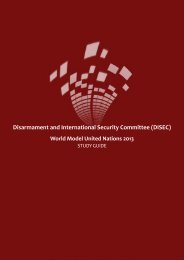SPECPOL - World Model United Nations
SPECPOL - World Model United Nations
SPECPOL - World Model United Nations
You also want an ePaper? Increase the reach of your titles
YUMPU automatically turns print PDFs into web optimized ePapers that Google loves.
migrant workers that they might use to seek out legal<br />
aid and report abuses. Should governments have a<br />
specialized agency that deals specifically with migrant<br />
workers, or some other mechanism of ensuring<br />
their rights are respected? What mechanisms of<br />
oversight should be put in place to monitor migrant<br />
workers’ rights in various countries? Should it be<br />
the responsibility of the ILO to monitor and address<br />
claims of worker abuse, or should it be given to<br />
another organ? In addition, there should be an<br />
explanation of the measures taken should a country<br />
be convicted of having exploited migrant workers. It<br />
is not necessary to be overly specific, but a general<br />
outline of the processes by which the <strong>United</strong> <strong>Nations</strong><br />
will discourage such exploitation is useful.<br />
Finally, the resolution must address the issue of<br />
recruitment agencies and private contracts. There<br />
must be a framework in place to address agencies<br />
accused of misleading immigrants, and the resolution<br />
must detail what powers are given to nations to<br />
regulate recruitment agencies within their borders.<br />
in addition, under what circumstances can a contract<br />
signed by a migrant worker be nullified? Elucidating<br />
the relationship between contracts and international<br />
law regarding workers will be useful in determining if<br />
exploitation has occurred at all.<br />
There are many other questions that remain<br />
unanswered that might be included in a resolution.<br />
For instance, it might be important to address sharp<br />
cultural or religious differences that could potentially<br />
cause problems during labor negotiations. There<br />
are so many issues to be considered that it can be<br />
daunting to try and find a resolution that provides<br />
every solution, so instead try and pinpoint the most<br />
pertinent issues that can be applied uniformly to all<br />
nations. Specifics are good, but keep in mind that<br />
a resolution might fail if it is too specific and not<br />
applicable enough.<br />
Questions to consider:<br />
• What qualifies a migrant worker?<br />
• to what protections and rights is a migrant<br />
worker entitled?<br />
• On whom will the responsibility be placed of<br />
addressing workers’ complaints?<br />
• How must countries regulate worker<br />
•<br />
recruitment centers?<br />
Under what conditions can a worker’s contract<br />
be nullified?<br />
Key Actors and Positions<br />
Much has already been written in this guide about<br />
the importance of the Middle east as a destination<br />
for workers around the globe. Home to millions of<br />
migrant workers, who sometimes outnumber the<br />
native population, the Middle East has already been<br />
implicated in several instances of worker exploitation<br />
and continues to face pressure from various<br />
migrant-sending countries to reform its labor laws.<br />
Complications arise during considerations of what<br />
amounts to cultural differences, such as the supposed<br />
mistreatment of women, and what constitutes<br />
specific and deliberate worker exploitation. The<br />
history surrounding the development of the Middle<br />
east as an international destination for millions of<br />
workers has been more clearly explained in the<br />
section “History of the Problem.”<br />
The problem essentially splits the world into two<br />
groups: countries that send migrants overseas to<br />
work and the countries that receive them. Typically<br />
the former group is composed of poorer, less<br />
industrialized nations whose economies depend on<br />
the remittances sent home by these workers. They<br />
are also typically the countries spearheading efforts<br />
to institute labor reform and ensure the protection<br />
of their citizens abroad. Yet because they tend to be<br />
poorer and are dependent on these workers, they have<br />
far less power to enact change on an international<br />
scale. The very reasons for which migrants choose to<br />
leave these countries are also responsible for their<br />
24<br />
Melbourne Host Directorate PTY LTD | Office of Media and Design

















